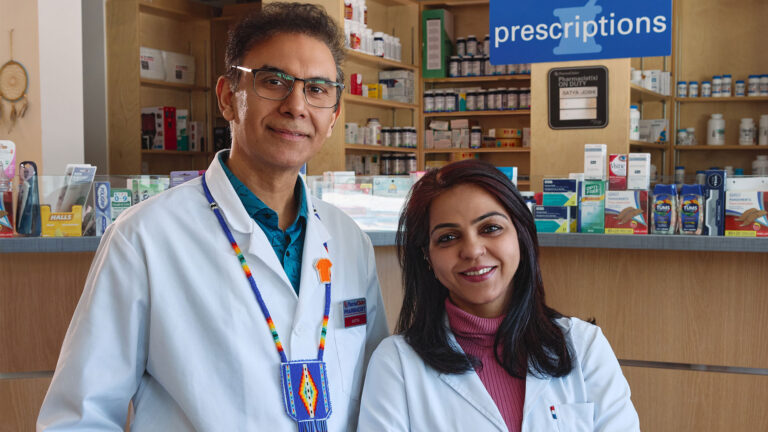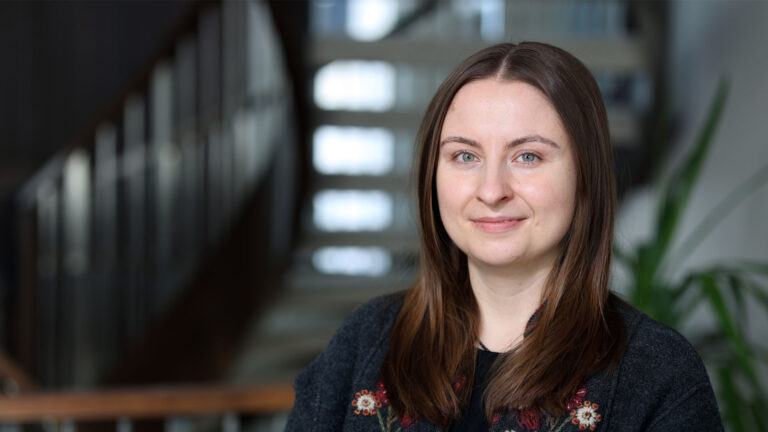
The below article was published in ACP’s 2023-24 annual report. Read the full annual report on the ACP website.
When you first meet Satya Joshi, owner and licensee of the Morley Pharmacy, you notice right away the brightly coloured First Nations medallion he proudly wears around his neck.
“When somebody has done good for the community, the person is honoured by the community with a medallion,” said Satya. “It’s kind of like a lifetime achievement award for me. When I leave the reserve and talk to other people outside, the community here wants me to be their messenger to the world.”
The Morley Pharmacy is part of the Stoney Health Services facility in the First Nations settlement of Mînî Thnî (formerly known as Morley) on Treaty 7 territory, about 50 kilometres west of Calgary. Mînî Thnî is located within the Stoney Indian Reserve and is home to the people of three distinct First Nations: Bearspaw, Chiniki, and Goodstoney.
“I thought I could make a difference here,” said Satya, who started working as a relief pharmacist in Mînî Thnî in 2006 before taking over the Morley Pharmacy licence in 2010.
When Satya first arrived, there were no regular physicians in the community. Trips to the hospital for minor health conditions were common. Today, Stoney Health Services provides family medicine, dental services, and mental health services. Satya and his wife Payal (Dimple), another pharmacist who joined the Morley Pharmacy team in 2015, collaborate with other health providers in the facility to ensure continuity of care for each patient. The pharmacy is bustling. Everyone knows each other. It is a true community hub.
“I am very honoured when community members come,” said Dimple. “They confide in us with their issues. Helping them through their health journey has helped us build trust and relationships through the years. It is very rewarding.”
It didn’t happen overnight. Satya and Dimple invested the necessary time and effort so that they could effectively collaborate with community members and provide optimal care.
“The biggest issue when we first arrived was that many community members did not believe in some of the treatments available to them,” said Satya. “They followed their own natural treatments and holistic medications according to their culture. Many would not see a doctor to get diagnosed or take medication, so it took a lot of time to establish relationships, build trust, and work with them so that they understood how important it is to take their medications and follow their care plans.”
As part of relationship building, Satya would offer to personally take patients to appointments to ensure they received diagnoses for their conditions and understood the care options available.
“I would tell them, let’s go for the test,” said Satya. “I would drive them to the lab. If they didn’t want to take medication, at least they would know what was happening. If they were diabetic and didn’t want to take the medication, at least they knew about their condition and could take other measures like cutting down on sugar and getting more exercise. They would agree to this. Gradually, they started taking medications because of the trust and relationships we established over time.”
Satya and Dimple have immersed themselves into the local culture as much as possible. Often, Satya will greet patients, especially elders, with words of welcome in the Stoney language—an effort that does not go unnoticed.
“I teach a bit of the Stoney language at the University of Calgary,” said patient Terry Rider, who operates the local radio station. “I say a few words to him and he picks it up fast. The more he learns, the better.”
“The bond gets better, definitely,” Satya added. “Everybody here knows I come here for them. When they get this understanding that the person behind the counter is here for them, and they can talk with this person, and they can rely on this person, half of your job is done.”
Chief Clifford Poucette of the Goodstoney Nation echoes those sentiments. He says Satya, Dimple, and the pharmacy team have made a tremendous impact on the community.
“The pharmacy is doing great,” said Chief Poucette. “We love it. We just did a major renovation at the health centre. The team there does a great job.”
The success of the Morley Pharmacy is hardly an accident. Satya and Dimple are intentional with their efforts and treat everyone who walks through their door with the same level of dignity and respect. Satya says recent equity, diversity, and inclusion learning programs provided by the ACP Continuing Competence Program have been valuable for his team and all pharmacy professionals.
“These programs help us think about things we may have taken for granted,” said Satya. “If a person comes in who you don’t know—it’s your first interaction—if you know something about the person’s culture, it helps. Rather than being sorry later, if we are thoughtful with our conversations, that helps.”
Gaining an appreciation for First Nations’ rich cultures has been the highlight during Dimple’s time at the Morley Pharmacy.
“There is a familiarity with our (Indian) culture, too,” said Dimple. “The families live together. When you stay here, there is a charisma in the community. You want to be here.”
For Satya, providing pharmacy services to this First Nations community has been the most rewarding work of his career.
“I would have retired five years ago, but I don’t want to,” said Satya. “When we started, it was a job. I worked 40 hours a week for myself. Now we feel like we’re working for others. It gives you more satisfaction when you’re not just working for yourself. You don’t feel as tired. You don’t dislike your work. We love it.”




